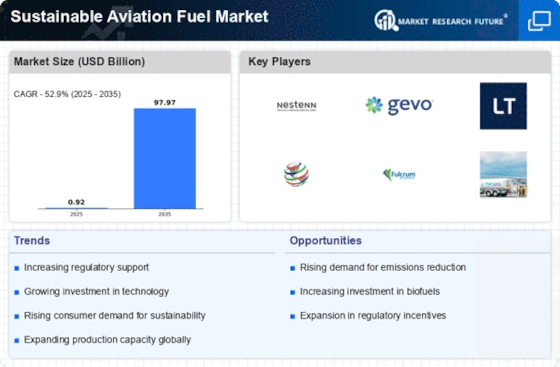Top Industry Leaders in the Sustainable Aviation Fuel Market

*Disclaimer: List of key companies in no particular order
Top listed global companies in the Sustainable Aviation Fuel industry are:
Northwest Advanced Biofuels, LLC.
Red Rock Biofuels
Fulcrum BioEnergy, Inc.
Aemetis, Inc.
TotalEnergies SE
OMV Aktiengesellschaft
Neste Oyj
SKYNRG
Gevo Inc.
Eni SPA
Avfuel Corporation
SG Preston Company
Sundrop Fuels Inc.
Ballard Power Systems
Velocys
ZeroAvia, Inc
Bridging the Gap by Exploring the Competitive Landscape of the Sustainable Aviation Fuel Top Players
The global sustainable aviation fuel (SAF) market is soaring, fueled by stringent emission regulations, rising environmental consciousness, and lucrative growth prospects. this nascent field is drawing a diverse range of players, each jostling for a piece of the pie. Analyzing their strategies, understanding key market share determinants, and tracking emerging trends becomes crucial to navigate this dynamic landscape.
Key Players and Their Strategies:
- Established Energy Giants: Oil majors like Neste, Shell, and ExxonMobil are leveraging their existing infrastructure and refining expertise to scale up SAF production. Neste, with its pioneering investments in renewable feedstocks, boasts a sizable market share and aims for further expansion through strategic partnerships and capacity building. Shell's focus lies in developing next-generation technologies like Power-to-Liquids, while ExxonMobil emphasizes collaborations with airlines and governments to incentivize SAF adoption.
- Biofuel Pioneers: Companies like Fulcrum Bioenergy and World Energy specialize in SAF production from biomass, offering alternatives to conventional fossil fuels. Fulcrum's focus on waste-to-fuel technology ensures feedstock security and aligns with sustainability goals, while World Energy's strategic location in California gives it access to favorable policy frameworks.
- Airlines Leading the Charge: Progressive airlines like United Airlines and KLM Royal Dutch Airlines are actively investing in SAF production facilities and long-term supply contracts. United's partnership with Boeing and Honeywell for a green jet fuel refinery in Illinois showcases strategic vertical integration, while KLM's commitment to a 70% SAF blend by 2050 demonstrates industry leadership.
- Technology Disruptors: Emerging players like SkyNRG and LanzaTech are challenging the status quo with innovative feedstocks and production processes. SkyNRG's utilization of waste fats, oils, and greases offers cost-effective solutions, while LanzaTech's use of waste gases for SAF production holds immense potential for scalability and sustainability.
Factors for Market Share Analysis:
- Production Capacity and Feedstock Availability: Companies with access to efficient production facilities and secure feedstock sources, like Neste's partnerships with agricultural producers, gain a competitive edge.
- Cost Competitiveness and Policy Incentives: Affordability remains a crucial factor, with government subsidies and carbon pricing mechanisms influencing SAF adoption. Companies innovating in cost-effective technologies and securing favorable policy support stand to benefit.
- Geographical Presence and Distribution Networks: Building robust supply chains and establishing refueling infrastructure near key air travel hubs are crucial for market penetration. Players expanding globally and collaborating with airports gain an advantage.
- Technological Partnerships and Collaborations: Partnering with airlines, research institutions, and other industry stakeholders in technology development and commercialization fosters innovation and facilitates market access.
New and Emerging Trends:
- Diversification of Feedstocks: Moving beyond traditional biofuels, companies are exploring waste-based feedstocks like municipal solid waste and algae, offering sustainable and low-carbon alternatives.
- Drop-in SAF Solutions: This next-generation technology allows SAF to seamlessly blend with conventional jet fuel, eliminating infrastructure modifications and facilitating faster adoption by airlines.
- Hydrogen-Based Fuels: Looking beyond biofuels, the exploration of hydrogen and electricity-derived synthetic fuels holds immense promise for long-term decarbonization of aviation.
Overall Competitive Scenario:
The SAF market is characterized by intense competition, with established players leveraging their resources and emerging companies offering innovative solutions. Collaboration, technological advancements, and adapting to evolving policy landscapes will be key for gaining market share. As sustainability becomes a core value in the aviation industry, the race to develop commercially viable and scalable SAF solutions is likely to intensify, paving the way for a greener future for air travel.
Latest Company Updates:
Northwest Advanced Biofuels, LLC:
- October 2023: Signed a fuel supply agreement with Alaska Airlines for 18 million gallons of SAF over 5 years. (Source: Northwest Advanced Biofuels website)
Red Rock Biofuels:
- November 2023: Partnered with Delta Air Lines on a pilot program to utilize SAF blend for flights at Portland International Airport. (Source: Red Rock Biofuels press releases)
Fulcrum BioEnergy, Inc.:
- November 2023: Entered into a multi-year supply agreement with American Airlines for 85 million gallons of SAF. (Source: Fulcrum BioEnergy website)
Aemetis, Inc.:
- December 2023: Partnered with Alaska Airlines on a joint venture to produce SAF from renewable oils and fats. (Source: Aemetis investor relations)

